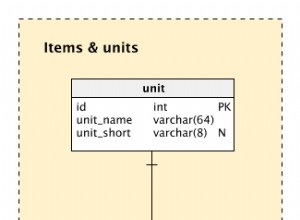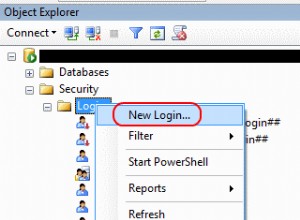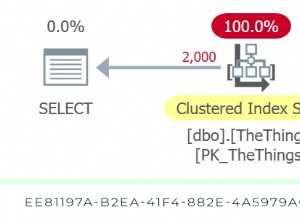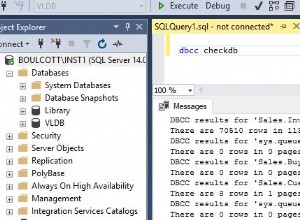Este código fornece um padrão que você pode estender para lidar com o espaço em branco de sua escolha para um
LTRIM modificado . declare @Tab as NVarChar(1) = NChar( 9 );
declare @Space as NVarChar(1) = NChar( 32 );
declare @Samples as Table ( String NVarChar(16) );
insert into @Samples ( String ) values
( 'Foo' ),
( @Tab + 'Foo' ),
( @Space + 'Foo' ),
( @Space + @Tab + 'Foo' ),
( @Tab + @Space + 'Foo' );
select String, Len( String ) as [Length], PatIndex( '%[^' + @Tab + @Space + ']%', String ) - 1 as [WhitespaceCount]
from @Samples;
O
REVERSE pode ser usada para implementar uma versão modificada de RTRIM . ATUALIZAÇÃO MAIS NOVA :O código a seguir usa a lista de caracteres de espaço em branco usada no .NET Framework 4. Ele também funciona em torno do recurso de
LEN sem contar os espaços em branco à direita. declare @Tab as NVarChar(1) = NChar( 9 );
declare @Space as NVarChar(1) = NChar( 32 );
declare @Samples as Table ( String NVarChar(16) );
insert into @Samples ( String ) values
( 'Foo' ),
( @Tab + 'Foo' ),
( @Space + 'Foo' ),
( @Space + @Tab + 'Foo' ),
( @Tab + @Space + 'Foo' ),
( @Tab + 'Foo' + @Space ),
( @Space + 'Foo' + @Tab ),
( @Space + @Tab + 'Foo' + @Tab + @Space ),
( @Tab + @Space + 'Foo' + @Space + @Tab ),
( 'Foo' + @Tab ),
( NULL ),
( ' ' ),
( @Space + NULL + @Tab + @Tab ),
( '' ),
( 'Hello world!' );
declare @WhitespacePattern as NVarChar(100) = N'%[^' +
NChar( 0x0020 ) + NChar( 0x00A0 ) + NChar( 0x1680 ) + NChar( 0x2000 ) +
NChar( 0x2001 ) + NChar( 0x2002 ) + NChar( 0x2003 ) + NChar( 0x2004 ) +
NChar( 0x2005 ) + NChar( 0x2006 ) + NChar( 0x2007 ) + NChar( 0x2008 ) +
NChar( 0x2009 ) + NChar( 0x200A ) + NChar( 0x202F ) + NChar( 0x205F ) +
NChar( 0x3000 ) + NChar( 0x2028 ) + NChar( 0x2029 ) + NChar( 0x0009 ) +
NChar( 0x000A ) + NChar( 0x000B ) + NChar( 0x000C ) + NChar( 0x000D ) +
NChar( 0x0085 ) + N']%';
-- NB: The Len function does not count trailing spaces.
-- Use DataLength instead.
with AnalyzedSamples as (
select String, DataLength( String ) / DataLength( NChar( 42 ) ) as [StringLength],
PatIndex( @WhitespacePattern, String ) - 1 as [LeftWhitespace],
PatIndex( @WhitespacePattern, Reverse( String ) ) - 1 as [RightWhitespace]
from @Samples ),
TrimmedSamples as (
select String, StringLength, [LeftWhitespace], [RightWhitespace],
case
when String is NULL then NULL
when LeftWhitespace = -1 then N''
else Substring( String, LeftWhitespace + 1, StringLength - LeftWhitespace )
end as [LTrim],
case
when String is NULL then NULL
when RightWhitespace = -1 then N''
else Reverse( Substring( Reverse( String ), RightWhitespace + 1, StringLength - RightWhitespace ) )
end as [RTrim],
case
when String is NULL then NULL
when LeftWhitespace = -1 then N''
else Substring( String, LeftWhitespace + 1, StringLength - LeftWhitespace - RightWhitespace )
end as [Trim]
from AnalyzedSamples )
select N'"' + String + N'"' as [String], StringLength, [LeftWhitespace], [RightWhitespace],
N'"' + [LTrim] + N'"' as [LTrim], DataLength( [LTRIM] ) / DataLength( NChar( 42 ) ) as [LTrimLength],
N'"' + [RTrim] + N'"' as [RTrim], DataLength( [RTRIM] ) / DataLength( NChar( 42 ) ) as [RTrimLength],
N'"' + [Trim] + N'"' as [Trim], DataLength( [TRIM] ) / DataLength( NChar( 42 ) ) as [TrimLength]
from TrimmedSamples;




